The allure and mystique of Armenia
As a nation, Armenia has endured more than its fair share of atrocities throughout its recorded history. From Ottoman and Russian occupation, massacres and genocide to modern-day territorial disputes with its neighbors, Armenia has managed to thrive and stay strong and unwavering in face of incredible adversity. Its people are among the friendliest I have ever met, never hesitant to offer a smile or assist you in any way.
As a part of the Caucasus region in West Asia, Armenia is surrounded by Georgia (locally known as Sakartvelo) in the north, Turkey in the west, Azerbaijan to the east, and Iran south.
The genocide has largely brought about the formation of the great Armenian diaspora. There have been many prominent figures with Armenian blood proudly coursing through their veins, excelling in the fields of science (like Hovannes Adamian, a pioneer of color television), medicine (Noubar Afeyan, founder-CEO of Flagship Pioneering and co-founder of Moderna), sports (tennis star Andre Agassi), and entertainment (ever heard of Cher and the Kardashians? Yes! Those Kardashians) that have left indelible marks on our lives. Some have even dominated the news or social media feeds for decades.
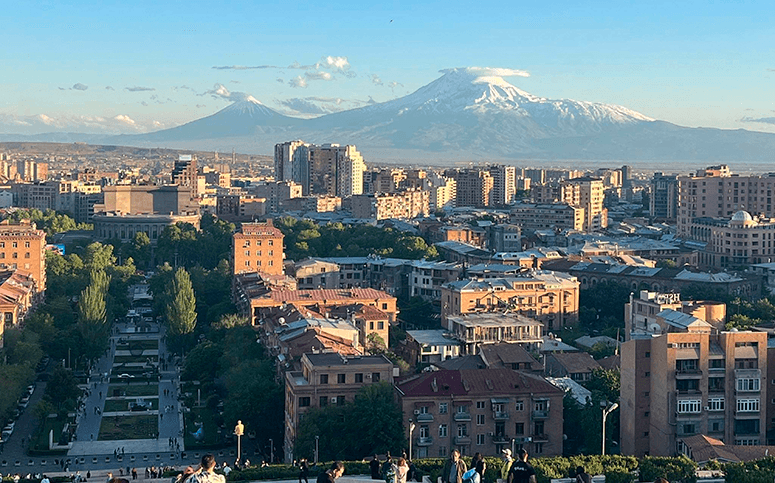
Getting there
E-visas must be obtained beforehand from evisa.mfa.am, which will set you back about four US dollars. The whole process is very straightforward and simple. Approval rates for Filipinos are very high (most of the rejections occur due to errors on the online application). There are two options to reach your destination:
- Book a flight from Manila (or wherever you’re coming from) to Yerevan.
- Take a van or private car from Tbilisi (the capital city of Georgia) to Armenia. Being the budget-conscious traveler that I am, this was the easier option for me as I was already touring in Georgia at the time. It was a five- to six-hour trip that involved long winding roads and breathtaking views of mountains and forests.
Experiencing Armenia
Item number one on my itinerary was a city tour of the capital. The first thing that I noticed when I touched down in Yerevan was how well-kept the city is. Most of the city can be accessed simply by foot or renting electric scooters. From the Opera and Ballet Theatre, to Freedom Square, and to Republic Square, Yerevan is never short of attractions and Instagram-worthy spots.
A refreshing taste of Armenian culture
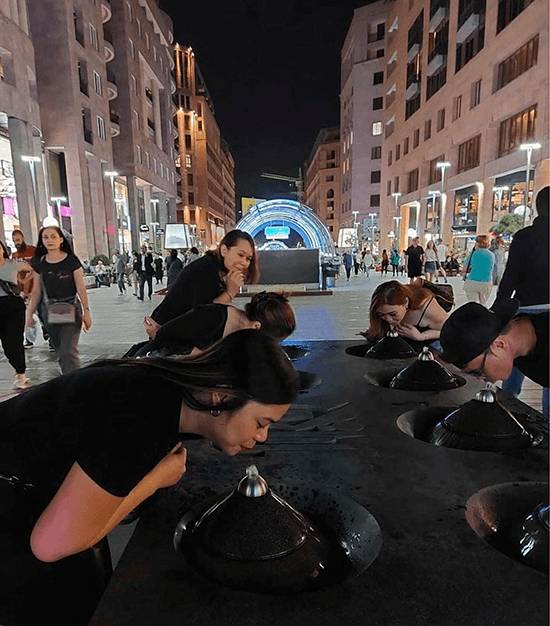
Nothing screams Armenia like the pulpulaks, which are small stone memorials with running water. I encountered several after a particularly long walk from the Opera House to the various restaurants and bars that adorn the streets of Yerevan. These drinking fountains are ubiquitous and found all around the city and other parts of the country (having tasted the water myself, they are great thirst quenchers).
Armenians love their potatoes, so it did not surprise me that their menus listed mainly dishes paired with potatoes on the side (like how rice is a staple for us Filipinos). Spicy, grilled, roasted—they have it all. Take them with kofta or—my favorite—grilled trout (the locals called it ishkan) and your taste buds will thank you.
Stairway to the heavens
Your stay in Yerevan City would not be complete without a visit to the Cascade Complex, a giant stairway of architectural beauty made from the finest limestone. Ascending the 750 steps to reach the top will require possession of a mighty pair of lungs or near-infinite stamina. Or you can just take the escalators, but where’s the fun in that?
All that huffing and puffing to reach the top of Cascade and what do you get for your efforts (not counting all those calories you burned)? Well, a gorgeous, jaw-dropping view of Mount Ararat, of course! The majestic snow-capped mountain beyond the city is a feast for the eyes and the senses that makes the challenging climb well worth it.
A mother and her sword
Our last stop in Yerevan before calling it a day was Victory Park. There was an imposing statue that was very hard to miss. Including its pedestal, the Mother Armenia monument has a height of about 51 meters. It is believed to symbolize peace with strength and evokes images of Armenian heroines and strong-willed women. Without a doubt, it is the centerpiece of Victory Park and was quite a sight to behold!
Because I was probably feeling the tiring effects of the long trip from Tbilisi to Yerevan and the following day was a scheduling nightmare, I skipped the tour to the Tsitsernakaberd Armenian Genocide Memorial. It was a decision that, in hindsight, was very regrettable. Who knows if I’d have the opportunity to visit this lovely country again?
Shades of blue
The second day of my Armenian escapade was, to put it lightly, packed to the brim. Taking a routed taxicab (locally called marshrutka) or private car from Yerevan to Lake Sevan is a 40- to 50-minute journey to Gegharkunik Province. Once there, we took a ferry boat trip across the lake and what an exhilarating experience it was. No exaggeration: as massive as this lake is, it is unreal how pristine the waters are. In fact, the entire lake is reportedly drinkable (I might test the waters—pun intended—if I do return).
The short boat ride made me realize how l love the way bodies of water reflect the color of the skies. Where the lake and the sky seem to meet, it’s like looking at a canvas splashed with all the blues from the visible light spectrum. To be treated with crisp air above the surface and feeling the teal-hued waves gently rocking you below, I savored every minute of my Sevan journey.
In ruins, but still standing
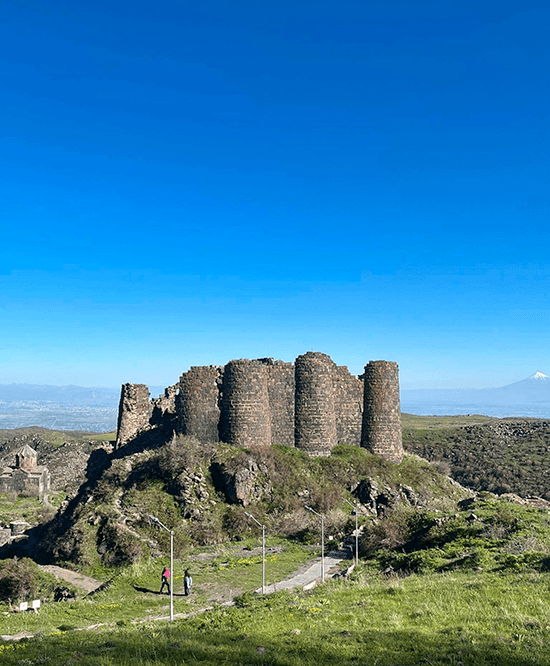
On the slopes of Mount Aragats proudly stands the Amberd Fortress, which was built in the 10th century. Translated from Armenian, it literally means “fortress in the clouds.” It has faced multiple invasions and attacks from enemies around the globe; however, it has outlasted them all. In many ways, it perfectly epitomizes Armenia’s tenacity. And oh, you can find a bath house south of the fortress if that catches your fancy.
Oh my Gosh, indeed
After grabbing a quick lunch, we found ourselves back on the road for our next destination. Built around the 12th or 13th century, Goshavank is a monastery complex located in the Gosh Village in the Province of Tavush. What impressed me about it is how it is in relatively good repair compared to most monasteries I have seen. The complex is composed of the St. Astvatsatsin, Grigor Lusavorich, and St. Gregory churches as well as a couple of chapels. Goshavank also houses a khachkar, which is a slab of stone meticulously carved with a cross and various intricate designs. The village is named in honor of Mkhitar Gosh, an Armenian scholar who has his own monument within Goshavank’s premises.
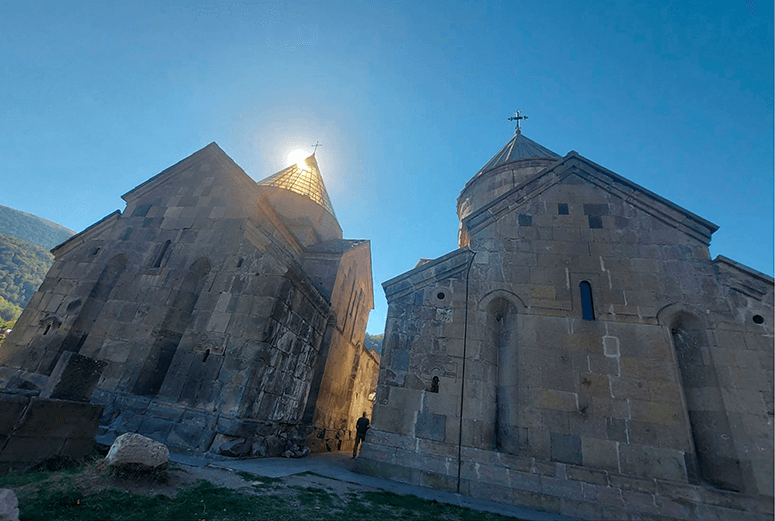
Lake Parz in Dilijan was the final destination before we headed back to Yerevan. Though not as large or as mesmerizing as Lake Sevan, it made up for it with rows of colorful paddle boats that you could rent and a zip-line that sends you speeding above the lake
The slew of activities, sights and sounds got me out of my accommodation from dawn to dusk, a fact that made me collapse on my bed like a pile of rocks the moment I entered my room.
Follow the light
The third and final day of the tour was less packed but no less eventful.
The first stop was in Kotayk Province where I laid eyes on one of its crown jewels: the Geghard Monastery. There was something about this medieval monastery that pulls you in. From the ray of light peeping through the opening at the zenith of the spherical cupola, to random tourists belting out soulful “Ave Maria”s inside the hallowed grounds of Upper Jhamatun, to the carved walls and surrounding cliffs, Geghard Monastery is just one of the three UNESCO Heritage Sites found in Armenia. One interesting tidbit is that it once served as the home of the Spear of Destiny, the lance that was believed to have pierced the side of Jesus Christ.
Nature’s orchestra
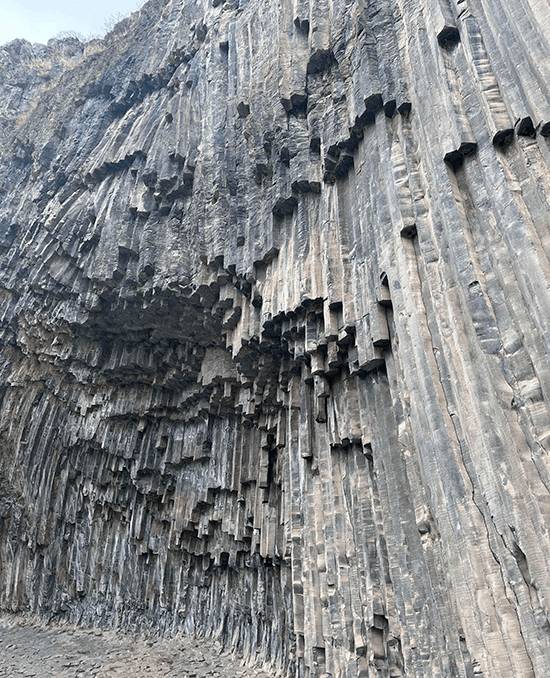
The so-called Symphony of Stones is Mother Nature’s handiwork on full display. A natural monument that is the pride of Kotayk Province, it has an uncanny resemblance to a gigantic organ owing to the fact that it has innumerable basalt column formations on the cliff walls. Whatever you do, you must see it with your own eyes. Take a hundred photos and selfies. Just be careful and wary of falling rocks.
A sun God’s domain
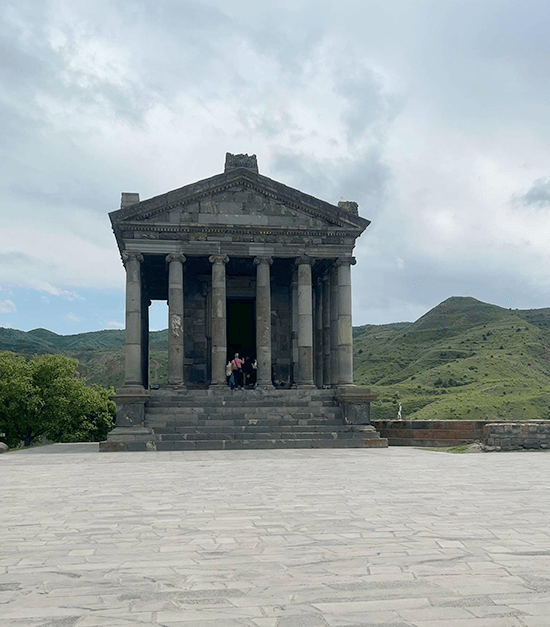
Built just before Armenia’s conversion to Christianity and located not far from the Symphony of Stones, the Temple of Garni is a pagan temple that was dedicated to the worship of the sun god Mihr. It stands right at the edge of a triangular cliff where you can catch a gorgeous panoramic view of the Gegham mountains as the backdrop. It was also debated that this colonnaded Greco-Roman structure was actually a tomb, a point of discussion that could have saved it from sharing the same fate of other pagan temples that were obliterated. It was reconstructed after a massive earthquake dealt serious damage to its structural integrity.
This was my absolute favorite spot in Armenia. I couldn’t take my eyes off of it. My phone’s photo gallery was flooded with dozens of pictures taken from every angle I could think of. If I do return to Armenia—and the probability is high—I would revisit this place at the very first opportunity.
When it was time for me to return to the desert heat and the harsh Arabian sun of the Middle East, I could not help but feel a part of me had stayed in Armenia. Here beats the heart of a proud nation that far exceeds the sum of its land area, and for this reason, I offer my eternal admiration.
The allure of Armenia is formidable, and I am hopelessly captivated.
* * *
Special thanks to the people at NotChicken Travel and MK Hotel and Tours for making my stay in Armenia such a pleasurable and unforgettable experience.


